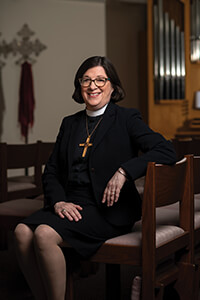One body, one spirit, one hope
September 1, 2023
As I write this the Lutheran World Federation (LWF) is preparing to gather in Kraków, Poland, for its 13th assembly. Delegates, observers, guests and staff from the 149 member churches in 99 countries representing 77 million people will gather for worship, Bible study and deliberation. We will sing and pray in hundreds of languages—a veritable Pentecost!
It’s an amazing gathering of people from all over the globe—different cultures, geographies, cuisines, clothing styles, governments, weather. When we gather in September it will be the beginning of fall for those from the Northern Hemisphere and the beginning of spring for those from the Southern Hemisphere. We come from mountains, deserts, plains, tropical and temperate rainforests, and six continents. Our political systems and realities are different. Many will come from war zones. Creation care is not theoretical for those coming from drought or from island homes sinking into the sea.
Imagine the diversity. We literally come from different worldviews. Homogeneity doesn’t describe the LWF, nor is it a goal. Instead, we understand ourselves to be living in reconciled diversity, not uniformity.
The assembly’s theme, “One Body. One Spirit. One Hope,” might seem to contradict our understanding of unity, not uniformity. It comes from Ephesians 4:4-6: “There is one body and one Spirit, just as you were called to the one hope of your calling, one Lord, one faith, one baptism, one God and Father of all, who is above all and through all and in all.” But there is a difference between how the world is organized and understands things and the way God has established God’s realm.
Are they spirits of division, exclusion and oppression or the Spirit of unity, inclusion and liberation?
The world seeks to impose uniformity. “Unity” can be weaponized in order to control people and communities. “Unity” sets rigid and impermeable boundaries that keep some in and others out. In God’s economy (from oikos—Greek for “house,” not the yogurt), unity in Christ is a gift, it is inclusive. It not only allows diversity but celebrates it. And it is reconciled diversity, which allows difference within a people because we are joined together in Christ by baptism. It has always intrigued me that at Pentecost the Spirit didn’t reverse the confusion of language that God had brought about to disrupt the hubris of those who sought to build the tower of Babel (Genesis 11:1-9). Instead, the rich diversity of language, beautifully distinctive for each culture, was maintained. This is how we understand “one body.”
The spirit of the world, particularly in 21st-century America, is one of radical individualism. The individual self is paramount. We are all to be self-made people. Well, no one came into this world by themselves—other people were involved. We are called to “test the spirits” (1 John 4:1). Are they spirits of division, exclusion and oppression or the Spirit of unity, inclusion and liberation?
The world’s understanding of hope is something concrete and achievable. We are led to believe that we can make our own destiny, that what we hope for is actually what we need. Hope is based on what we can see, what we know. In God’s economy, hope is a gift of the Spirit generated not from within but created when a promise is spoken from the outside. In Hebrews we read that “faith is the assurance of things hoped for, the conviction of things not seen” (Hebrews 11:1). Hope is eschatological—the goal and end of God’s will for all of us and creation—and proleptic—already realized in Christ, the future that is present now.
It may seem foolish that the LWF will gather in all its diversity next door to the war in Ukraine and in the shadow of Auschwitz-Birkenau, a former Nazi concentration camp. That we will dare to live and witness as one body, one spirit, one hope in a world bent on division, engaged in war and proximate to the site of one of the greatest evils that humankind has perpetrated. But that is precisely where the church needs to show up.


